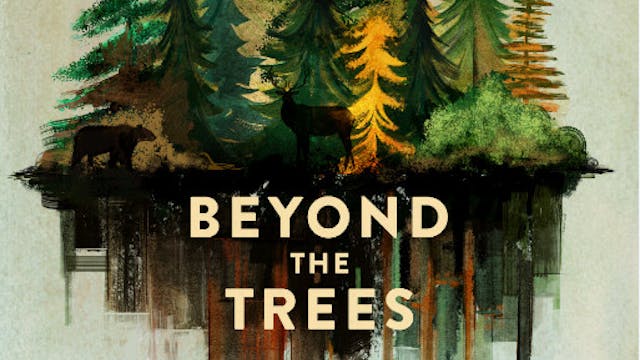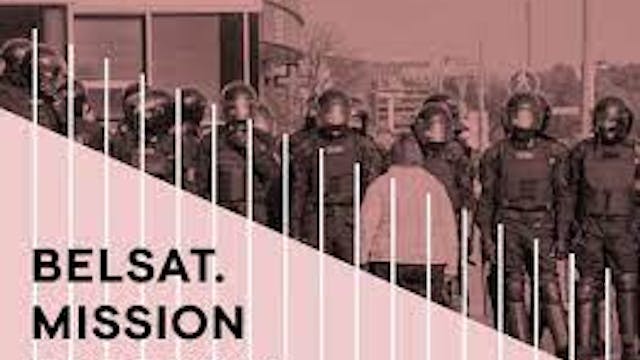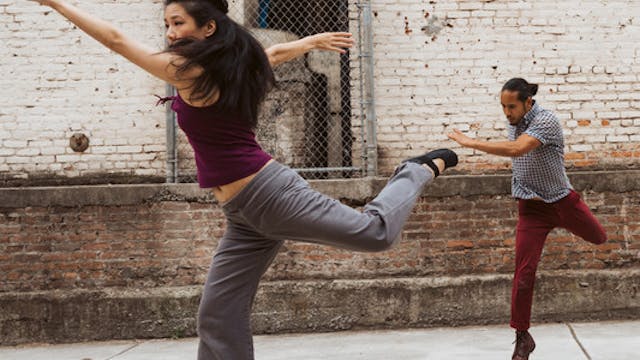CANNIBALIZING THE CONDUCTOR short film, audience reactions (director interview)
New Releases
•
8m 23s
CANNIBALIZING THE CONDUCTOR, 30min., Austria/Germany, Documentary
Directed by Derek Howard, Emma W. Howes, Justin F Kennedy
Cannibalizing the Conductor is a hybrid film that combines dance with narrative and documentary filmmaking techniques to encourage deep observation of trance. Upheld for an extended duration, a group of performers improvise in various lucid
states that are altered by imaginative, movement and vocal-based tasks. Each performer moves and is moved by the camera. Interacting with each other and the camera itself, they engage with the filmic gaze to celebrate their own agency, while disrupting the monocular focus of the camera lens. They get out of their own way to channel newly uncovered knowledge through the forms of music, dance, sound, and ultimately the eye of the camera.
http://www.derekshoward.com/
Get to know the filmmakers:
1. What motivated you to make this film?
DH: This project came out of a workshop that Justin & Emma were leading as part of the Impulstanz Festival in Vienna. The workshop focused on dancing with/for a camera and after a week of workshopping, it culminated in a day of shooting that made up the film. The three of us have been collaborating on dance films for several years so this was a natural development that came out of this working dynamic, exploring themes we had already explored more fully in this project.
EWH: The intention to produce Cannibalizing the Conductor stemmed from many years of having worked independently and together in various capacities, which culminated in the workshop CAMming the CAM: Auto-Mythologizing for the CAMera, ImpulsTanz, Vienna (2021). It was a process that came out of a particular reciprocity in our collaboration, fueled by an urgency to challenge the cinematic gaze through an intersectional lens.
JFK: Cannibalizing the Conductor sprung from a workshop, CAMming the CAM: Auto-Mythologizing for the CAMera, facilitated by Justin and Emma at Impulstanz festival, Vienna, AT (2021). The workshop aimed to equalize and simultaneously problematize the power constructs inherent in cinematic gaze(s) and ethnographic capture(s). A sophisticated hybridization of documentary filmmaking techniques combined with trance dance and non-linear narrative to encourage deep observation of people/performers in a process of transformation.
2. From the idea to the finished product, how long did it take for you to make this film?
DH: The idea to do this project started about a year before we shot it in the summer of 2021. After shooting was complete we took about 5 months of on and off editing and then took a break and did post production the following fall, so it was almost 2 years in the making.
EWH: A few lifetimes. There were many embodied experiences that contributed to the making of this film.
JFK: The research leading up to CtC, one can say, has already taken up eons ... however, two years in total from conception to the dcp/finished product.
3. How would you describe your film in two words!?
DH: Camera dance.
EWH: Projection Deflection
JFK: Embodied Grafts
4. What was the biggest obstacle you faced in completing this film?
DH: Working with workshop participants as opposed to professional dancers / actors posed significant challenges. People have different expectations of what a workshop will consist of and for some the jump into a film production was at odds with these expectations.
EWH: It was ambitious of us to embrace the complexity of the subject matter, within the short and intensive timeframe of the workshop that culminated with the filming of the experience. I think this is one of the reasons why the editing process felt violent to me. I found it helpful to work together to find ways to sift through it all; to decipher what was essential to translate the workshop into a concise visual language.
JFK: Definitely, social relations... navigating and negotiating the slippage of using workshop participants as performers and trying to navigate and negotiate the ethics of labor / values of what was being bartered/offered in a workshop setting versus a film production. Editing was challenging, only because there was no distance during that period, although I gained a lot of skills regarding film editing and what the eye captures while watching. It was difficult trying to understand among three, the multiple directions that the film could be edited down to and, in the end, going with the most earnest version...
5. What were your initial reactions when watching the audience talking about your film in the feedback video?
DH: I loved all the reactions and was quite pleased to hear that people got the intention behind the film and appreciated its heavy atmosphere and attention to details. I think the most satisfying part of hearing the reactions was hearing how much people got into the details and nuances of the piece, and appreciated all the creative layers in there.
EWH: I found it inspiring to hear people's perceptions when approaching the use of abstraction in the film. I was curious to hear what people gleaned from the work; some directly echoed the themes that we were grappling with inside of the working process, while other subtexts went unmentioned. It is exciting to know that the work elicits discussion, as it did in the process of its production.
6. When did you realize that you wanted to make films?
DH: I've been making films as my main artistic medium since I was in high school, so for about 18 years.
EWH: I began making video art when I was at The Emily Carr institute of Art and Design. Previously I had performed for the camera; having come from a background in traditional ballet and baroque opera I had been trained to mirror back the desire of the choreographer/director. I felt a particular urgency to reclaim my body in relation to that specific gaze and began using the camera as a frame—as a makeshift 'theatre' or 'proscenium arch', and as a tool to help me to reclaim my agency.
JFK: tbh, I might be a bit scared and attracted to film, at the same time, because of its timelessness and relation to historical artifact. However, there is a beautiful impossible zone, in the slippage of power in ethnography, when bodies in movement are captured, and it's cool to try to make a film, that transcends its own conventions, by exploring the emancipatory potential of dancing and embodiment, for example.
7. What film have you seen the most in your life?
DH: this is a funny question. Probably Kubrick's "The Shining" or "Back To The Future Part II."
EWH: Fame, although that was a long time ago. I seldom watch a film twice.
JFK: Friday, Rocky Horror Picture Show, and Clueless are tied.
8. What other elements of the festival experience can we and other festivals implement to satisfy you and help you further your filmmaking career?
DH: I love this video feedback idea and think that should be used more widely. I think there should be more programs that create spaces for genre defying films and films of unconventional duration and viewing situations. I would love to see festivals drive the audiences towards new ways of seeing films in VR or 3D or in installations or live music, etc, I think festivals can play a larger role in pushing for those types of barrier breaking formats.
EWH:The video feedback came to me as a surprise; I was excited to see that festivals continue to develop frames to offer visibility for this type of work. I am curious to see if film festivals will work toward providing further opportunities for artists to expand the medium in dialogue with other formats. Since I am currently producing films that accompany live-performance and installations with fallible objects, this would be exciting to see.
9. You submitted to the festival via FilmFreeway. How has your experiences been working on the festival platform site?
DH: Satisfactory.
EWH: Derek took care of that one. Thank you, Derek.
10. What is your favorite meal?
DH: probably some form of soup dumpling.
EWH: Anything I can eat with my hands.
JFK: a Local stew
11. What is next for you? A new film?
DH: I am writing a hybrid script about a fortune telling in New York City.
EWH: I am currently in post-production of a three-channel film installation, 'Bang Bang Baroque', which will premiere at the Musée d'art de Joliette, QC Canada, in February of 2024.
JFK: research and residencies for a new science fiction opera, premiering in 2024. Performing in a new filmwork of Ligia Lewis.
Up Next in New Releases
-
BEYOND THE TREES short film, audience...
BEYOND THE TREES, 33min., USA
Directed by Anthony Gibbs
A determined team of climate champions—environmentalists, scientists, and investors—fight to restore our native forests by pioneering a unique management model that blends conservation with finance. -
BELSAT. MISSION FREEDOM feature film,...
BELSAT. MISSION FREEDOM, 53min., Poland
Directed by Mariusz Pilis
Two years after the rigged presidential election in Belarus and almost a year after the Russian aggression against Ukraine, the director of the film, Mariusz Pilis, visits the Belsat station. As he says, he was present at its birth... -
AND THE COMMUNITY WILL RISE short fil...
AND THE COMMUNITY WILL RISE, 63min., USA, Documentary
Directed by Lenora Lee
http://www.lenoraleedance.com/
https://www.facebook.com/LenoraLeeDance
https://www.twitter.com/LenoraLeeDance
https://www.instagram.com/LenoraLeeDanceGet to know the filmmaker:
1. What motivated you to make this fi...


